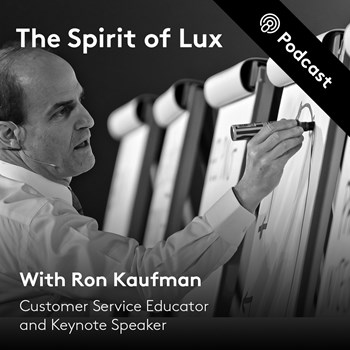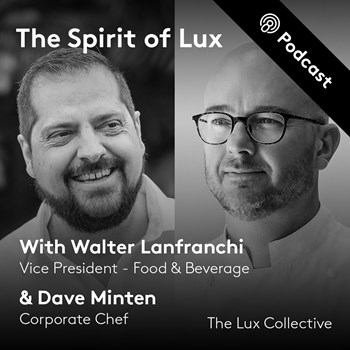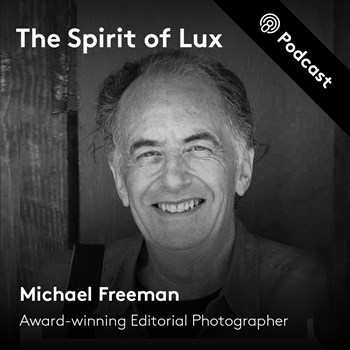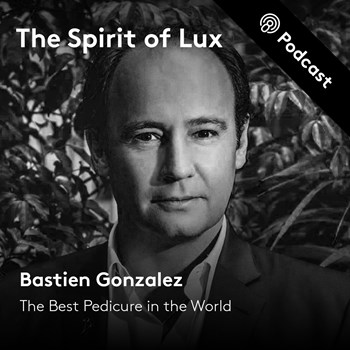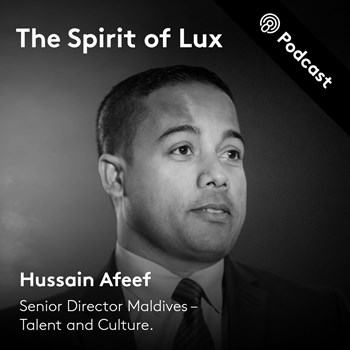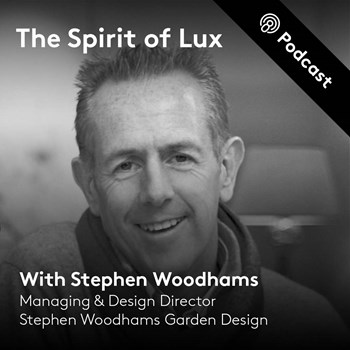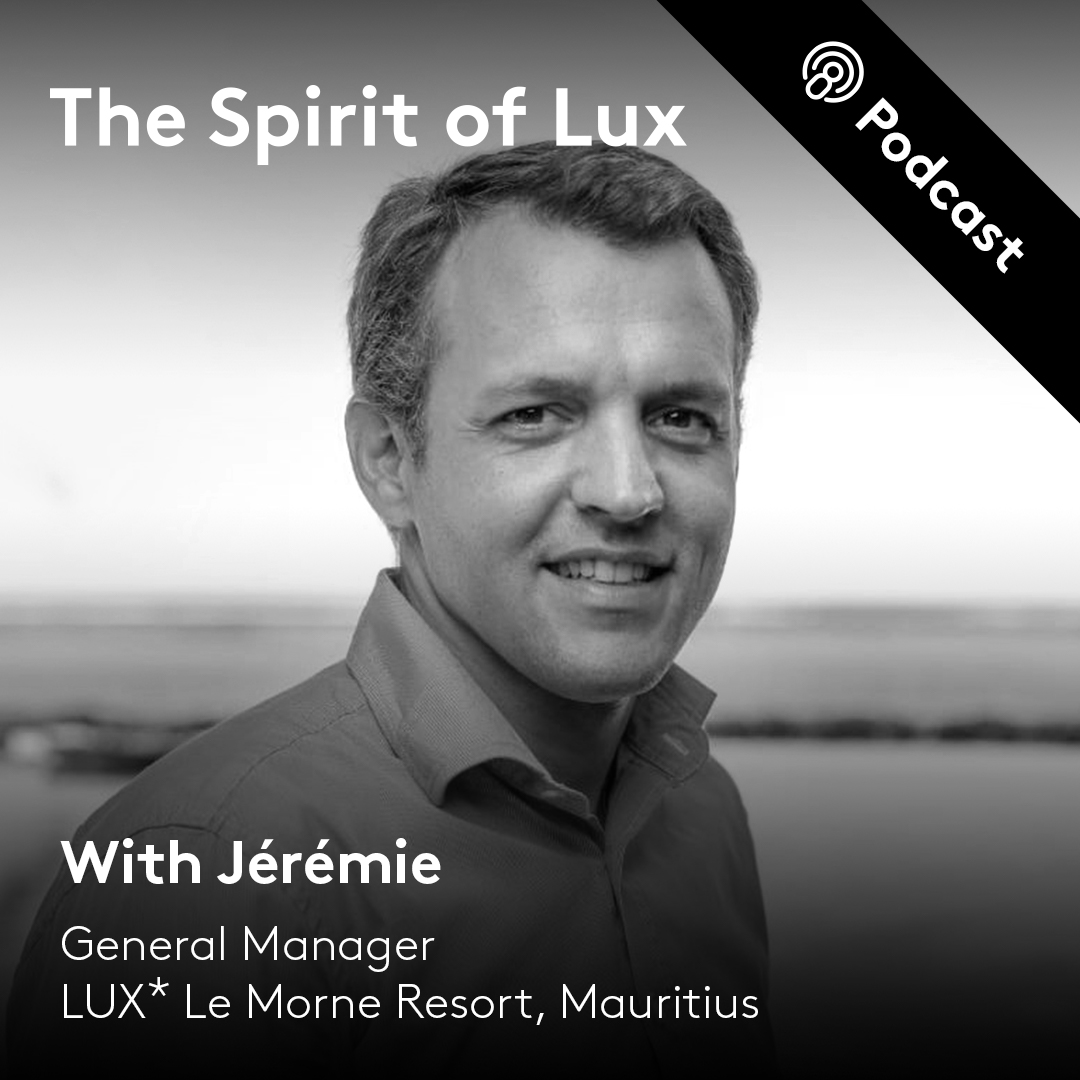 For this third episode of our hotel podcast, Paul, our host, chats with the passionate hotelier and General Manager of LUX* Le Morne Resort, Jérémie de Fombelle. In the middle of a pandemic, Jérémie rallied all 300 of his team members to upskill and renovate the hotel all by themselves! It was such a success that the London Business School has made it a case study. We also discuss the taboo that is food waste in the hotel industry and how LUX* Le Morne became the first Zero Food Waste hotel in Mauritius.
For this third episode of our hotel podcast, Paul, our host, chats with the passionate hotelier and General Manager of LUX* Le Morne Resort, Jérémie de Fombelle. In the middle of a pandemic, Jérémie rallied all 300 of his team members to upskill and renovate the hotel all by themselves! It was such a success that the London Business School has made it a case study. We also discuss the taboo that is food waste in the hotel industry and how LUX* Le Morne became the first Zero Food Waste hotel in Mauritius.
Lessons in leadership in the era of Covid with Jérémie de Fombelle
Paul Jones: I’m Paul Jones and you’re listening to The Spirit of Lux.
Jeremie de Fombelle: I love to say that Mauritius is the capital of the resort’s destination worldwide. For me, it's one of the best places to travel, to go and relax in a resort.
Jeremie de Fombelle: we sat around the table, we talked with you, Paul, with our owners, and we say, "Well, we had a plan to renovate this hotel, but it was for 2022-2023. Why not do it now?" And its next part of my answer is then we started to renovate this hotel and it has been a really unique adventure.
Jeremie de Fombelle: We became a school. We became a plumbing school, we became a painting school, we became a stone doctors’ school. We gave training to everyone for weeks and weeks before they could really become experts in specific tasks.
Paul Jones: Welcome to the third episode of The Spirit of Lux. Today I'm excited to have one of the most passionate hoteliers that I've ever met join me on this podcast. Jeremie de Fombelle is a highly experienced General Manager. He has worked in over six countries in Asia in the Indian Ocean and joined LUX* Le Morne in August 2014. There's a lot to cover in this episode, LUX* Le Morne is one of a kind. The resort has the renowned Le Morne Mountain, has the backdrop and faces the Indian Ocean nestled within a turquoise lagoon. With only 150 rooms and suites, Jeremie with his 300 strong team members took the ownership to reimagine and renovate the hotel during this long confinement. We also discussed the best practices for sustainability to combat food wastage and the three main approaches: refuse, reuse, and recycle. Good afternoon, Jeremy and welcome. And how are you today?
Jeremie de Fombelle: Good afternoon, Paul. I'm very good. Thank you so much. What about you?
Paul Jones: I'm doing fine. Thank you so much. And Jeremy, welcome. It's so good to have you with us. Tell me you are what we would describe as a global hotelier. You've operated hotels in many different countries. Could you give us a flavor of your career so far?
Jeremie de Fombelle: I am a nomad. I am a Globetrotter. I'm from France, Paris and I left more than 20 years ago. I worked in Cambodia, Vietnam. I worked Thailand, in Laos, in Bali. Actually I was working for a major hotel group, that Globetrotter GM, actually, I was sent with my team-- actually I had a chef, I had a fantastic hotel manager-- the three of us were moved to a new destination, to new hotel every two three years. And after Bali, I went to China. And then I went to Mauritius, I met you, I met LUX*, and I've been in this hotel LUX* now for the past seven years. I never stayed that long.
Paul Jones: Why you fell in love with LUX* Le Morne?
Jeremie de Fombelle: Exactly. I'm loyal. I'm faithful to LUX* Le Morne.
Paul Jones: That's wonderful. So, Jeremie, you've been in so many exotic destinations in your career. How do you find Mauritius? How does Mauritius stack up with all those wonderful destinations that you just mentioned?
Jeremie de Fombelle: Well, for me, Mauritius ticks many boxes for a tenure like me. I love to say that Mauritius is the capital of the resort’s destination worldwide. For me, it's one of the best places to travel, to go and relax in a resort. And because I am originally a resort guy and I love to walk in resorts and it's different than working in a business hotel or resort. It's kind of two different jobs.
Paul Jones: Right. What makes in your opinion a great resort hotel general manager? What are the three things you think are essential?
Jeremie de Fombelle: To really understand that host/guest don't host or don't welcome. Clients host guests. You would host your friends when they visit you at home, and that's what makes it great. You really know your guest. They can become your friend. And actually, many of my guests are my friends now. And I'm lucky to have guests all around the world just like you. I’m learning from you. And that's really what makes a great general manager. And then you will guide for your team. You're a leader and they trust you and you try to have a team and to keep this team because to host guests, you must trust the people who will host them with you.
Paul Jones: But you do it so well. You do it so well, Jeremie. But during the last 16 months, you and your team haven't been able to welcome any of your guests to LUX* Le Morne, have you?
Jeremie de Fombelle: No, we haven't, and it was so painful.
Paul Jones: And how did you spend your time, Jeremie? How did you and your team spend your time during this period?
Jeremie de Fombelle: Well, we started to be confined, it was so difficult. And for us, hoteliers, who sleep not much-- always on the ground, always on the floor, always welcoming guests, always with so many things to do, there's huge to-do list every day, when you stuck at home and you can't do anything or not much, it's very difficult. And I realized that we could not stay like this, doing nothing and waiting for the guests to come back here. Sitting at home was not our cup of tea. And we sat around the table, we talked with you, Paul, with our owners, and we say, "Well, we had a plan to renovate this hotel, but it was for 2022-2023. Why not do it now?" And it's next part of my answer is then we started to renovate this hotel and it has been a really unique adventure.
Paul Jones: What made it unique, Jeremie? What was so special about this decision that you took?
Jeremie de Fombelle: What made it unique is the period we are going through at the moment. We're still in is a unique situation. And renovating a hotel or planning and deciding to renovate a hotel when the borders of the country you're in is closed, so you can't import manpower because in Mauritius on construction side, you have mostly imported manpower. You have very limited freight, air freight costs. It is so difficult to plan anything. And of course, funding is even more difficult. It's always difficult, funding a renovation. But finding your renovation in the middle of a big pandemic is very difficult. So, it was really a unique situation. And what made it unique is that, step by step, with you, with the owners and as a team, we found solutions answers to all the constraints-- because we had only good reasons not to do anything and to just stay at home, to be honest. We had so many good reasons to just not do it, and we decided to do it and to go ahead.
Paul Jones: And what a magnificent sight to have. For the listeners, just to describe LUX* Le Morne, you have the image of this wonderful stretch of white sand beach with a gorgeous turquoise lagoon. And then right on the beach is the hotel. And behind the hotel, you have the magnificent Mountain of Le Morne. Absolutely stunning, incredible landmark, and a world heritage site. So, coming to work for you, Jeremie, every day must be an absolute pleasure. But this reimagining of your hotel took place against the background of so many difficult circumstances. And how did you manage to get so much commitment and inculcate so much energy from your team? What was Jeremy's magic sauce?
Jeremie de Fombelle: Well, you asked me before what made it unique and I would say the main thing that made unique is that, my team, I have slightly over 300 team members in my hotel. And as I said, there were no workers to do this renovation. And so, we said, "Well, we can't do it. That's not going to be possible." And then my team actually told me we can learn. And then the pastry guys became plumbers and we train them for weeks and weeks. Then they became plumbers or assistant plumbers, I would say. The finance guys became electrician, assistant electrician. The chef became a carpenter. The marketing people became stone doctors. We were in this pandemic and we had time. So, the magic was just that, we managed to convince people who could have stayed at home, we could not force them to come to work because it was the law. They could stay at home, get them outside, or they could come to work, join forces, be part of the fantastic project that we had for this hotel, to renovate it with our hands, to learn and to learn a new job. All of us, we all learned a new job. I became a project manager; this is not my job. I’m a hotelier. And I think the magic was just that this was so unique. This was so exciting. And we all want to learn; we all want to be part of the exciting projects. What you need is just to walk the talk. So, be ready to better yourself first, you know, and then people trust you, and then just convince people. But if you believe in it, people follow you. And you know that, Paul.
Paul Jones: Absolutely.
Jeremie de Fombelle: Much, much better than me.
Paul Jones: And did all of your team members participate, Jeremie?
Jeremie de Fombelle: Yeah. As I told you, out of 300 team members, we had two team members who didn't want to follow. So, I would say almost everybody followed. As I say, for six or seven months, they did a new job. My problem is that now some of them don't want to go back now that the job is done, and that we have a brand-new hotel. They don't want to go back to their old job.
Paul Jones: And how did the waiters do it being painters and carpenters? How did they measure up?
Jeremie de Fombelle: You have this expression, Paul, of half-baked job. I love this expression that you always use and you didn’t want to have a half-baked job. You wanted to have something done properly, etc. and so did I. So, we had to really take the time to train everybody. And we got, luckily, experts on the island, because again, the borders were closed so we can get anybody from abroad. And we got some experts on the island who came to train our team for two to three weeks. Of course, a chef, a cook cannot become an expert plumber in two weeks, but he can become an expert on some specific plumbing tasks, and that's what we did. So, everybody learned to do 3-5 tasks in each field, and it worked so well. And I would say, we had to change to actually compare because we had to give part of the renovation scope to a contractor at the end of the project then we could actually compare the job done by my team who are not originally professional, and the job done by contractors. And there was a world of difference. It was so nicely done because they were innovating their own hotel which is their second home. So, you learn so many things, such adventure.
Paul Jones: So, before they were allowed to pick up a paintbrush, you actually gave them training in painting?
Jeremie de Fombelle: We became a school. We became a plumbing school, we became a painting school, we became a stone doctors’ school. We gave training to everyone for weeks and weeks before they could really become experts in specific tasks.
Paul Jones: Jeremie, either I've been quite a while in this business as you know, but that is the first time that I've heard anything like that ever happening ever occurring. You really have created a world's first in the hospitality business. This is really superb. And for you to tell us that you were able to compare the job done by your team members compared with the professional contractor that was a world of difference, that speaks to people's passion, people putting their heart and soul into that job, which we know your team members do it anyway for the guests. But for them to do it, in the process of reimagining and renovating and improving your property is just phenomenal. And all the time they did it, not just willingly, but with so much enthusiasm. And tell me Jeremie, how did you manage with the authorities? Were there any hurdles that you had along the way?
Jeremie de Fombelle: Well, the authorities were actually quite flexible. We had questions from the union, because we have very good relationship with the union in this hotel and we work with them well, but they came to see me and they said, "Jeremie, they're not allowed to do that because it's not the job description of your team member, and there doing something totally different." I said, "Well, we give them training and they are not forced. They can stay at home if they prefer." And I told them, "Maybe there's no need to talk to me. Just go to hotel, spend the day and talk to the team. And if you feel that they are forced or unhappy, come back to see me." And after one hour, they come back to my office and said, "Well, thank you very much. We won't come back. We don't understand but your team seemed very happy." And they never came back. The authorities were pretty happy, maybe this is something we’ll discuss later on but because the concept of this renovation was the circular economy. The island was and still is on its knees. The economy is suffering and we decided to use only Mauritian resources. So, Mauritian workers, Mauritian manufacturers, Mauritian suppliers. 99% of everything that have been produced in this renovation have been produced and manufactured in Mauritius, using Mauritian only company. I think it's the first time ever that this is done in Mauritius.
Paul Jones: Wow! Because it is the first time, I think you were really setting the trend. And there was quite a buzz on the island.
For all our podcast listeners, enjoy a special 20% off on LUX* Le Morne’s best available rates with quoting Spirit of Lux when booking direct. Find out more information at luxresorts.com.
I heard that quite a number of your competitors and the competing hotel groups on the island were flocking to stay at your hotel when you were able to open up for local residents. Tell us a little bit about that, Jeremie?
Jeremie de Fombelle: Well, it was funny, because, yeah, we were open for a couple of weeks at the very beginning of the year. And they had never come before, all my competitors. I know them, of course, it's a small island, we all know each other. And suddenly, they all wanted to come for a weekend at LUX* Le Morne. They were all visiting and they had heard about it. And they told me actually, “We could not really believe that the quality.” And like I just said that there was a world of difference. They could actually check by themselves that the quality was there. And not only the quality, but we were offering a really unique product, a new unique experience. And the fact that job has been done by the team, you could feel it and you can feel it. You enter this hotel now; you feel it because you feel it in the sense of pride of the team. And actually the baker is going to say to the guests, "I'm the one who done this marble renovation and stone doctor job. I did it," and then explain and talk with the guests. It's pretty unique, what people feel now when they when they enter the hotel.
Paul Jones: Yes, quite a number of them. I heard they were just blown away with your talented team from the perspective of how much energy and passion they were putting into. They're welcoming the guests to the hotel and how they were displaying the care and the caring nature. Something that Ron Kaufman and I spoke a lot about on an earlier podcast. And they were pretty surprised. Were you surprised at all? Jeremie, was this a surprise for you? I'm sure a pleasant surprise. Or was that something that you anticipated might be the outcome?
Jeremie de Fombelle: As soon as my team told me, "We're going to embark the journey with you, we will follow you, it's a bit crazy, but we will follow you," I was pretty confident and it was not a big surprise. What was a surprise, to be honest, that they agreed to embark on the journey. And because, again, you had the choice to stay at home. They've worked a lot of work so much past years, because we've been very, very busy, too busy at the resort. And while we had decided to embark the team on this journey, I have to be honest with you, Paul, I said to my team, "I'm going to join, because you can stay at home and get paid to stay at home." And it's my team, my team of managers who told me, "Jeremie, let’s give it a try. Ask them, give them the choice.” Do you want to learn about painting? Do you want to learn about plumbing? Do you want to learn about electricity? Do you want to get trained? Do you want to be part of this? And they followed. So, that was a surprise that they agreed to embark on the journey. But as soon as they said," Yes, let's go, let's do it," I was so enthusiastic, I was so excited, I was pretty confident that we would do it.
Paul Jones: Jeremie, one of the hallmarks of LUX* Le Morne, the faithful guests, your predecessor, he had quite a number of guests who were very loyal to him. And since you took over, you also have increased that number of loyal faithful guests. Have you been in touch with them? Are they aware of what's been happening during this period of time that they haven't been able to return to their favorite hotel in the world?
Jeremie de Fombelle: I mean, I'm in touch daily with my guest. And I will be honest with you, Paul, they didn't give me any choice. They were asking me during the renovation, they want pictures, they were giving their opinions. They were saying, "I don't like this color, I don't like this lamp. You should change this; you should change this." So, you have to get them involved because they feel like they own a bit of the hotel. And actually, to be honest, that's the reality. They are our guests; we can't survive without them. They kind of own a bit of the hotel. So, yeah, they were really involved. And actually, many of them, we could not get any consultants because the borders were close. So, I actually used some of my guests to give some piece of advice, because I know that they are in this field of expertise and this and this. And many of them actually gave some really great advices. So, they were really part of the journey as well. And the feedback, unfortunately, they haven't stayed yet, because borders are going to open soon, but still close. And they haven't visited the place but they've seen and they have been discussed with my team, have discussed with me. And because we did it, they love it already. And what we call long stay guests or repeaters, they're pretty conservative. And that's why they are repeaters because they like it as it is. So, it's always a bit difficult to do renovation to change things with this type of guests. But because we did it, which was not done by contractors, they trusted us. And they already trust us and they love it.
Paul Jones: Well, Jeremie, Mauritius will be fully open in a couple of months’ times in October. And I'm sure you and your team are looking forward to welcoming all those faithful guests back to Le Morne and showing off your gorgeous hotel. And I have no doubt that you will be very successful. In fact, this whole story has been recognized and taken up by a very famous educational institution, the London Business School for their MBA program. Would you tell us a little bit about that, Jeremie?
Jeremie de Fombelle: Yes, it was a bit of a surprise. I got informed by one of our colleagues that the London Business School wanted to have a chat with me about renovation because they had heard about it. We had a one-hour chart a bit like what we're doing now, Paul. They said, "Well, we've been teaching the same case study for the past 10 years at the London Business School to our students and we feel that it's time to teach a new one. And this is really interesting." They wanted to dig further and to understand exactly the how, the why, and we're working on it. And as of first of January, the London Business School will teach the case study of LUX* Le Morne. It's really a big pride for my team because I can tell you at the very beginning when we were on this table with you on Zoom and with the owners who could not believe that this would become one day a case study at London Business School. We're very far from it.
Paul Jones: And Jeremie, I understand that you were able to work with the world's leading architect who's actually a Mauritian, John Mark. John worked with Ian Schrager in New York for quite a number of years and had recently returned to Mauritius. And he obviously contributed to what you were doing. Could you talk to us about John Mark's contribution to you to the project, please?
Jeremie de Fombelle: All this would not have been possible without him and not anyone else. It was only him who could do it. And thank you, Paul, because actually, you kind of saved us by presenting us John Mark at the very beginning of the project and said, "Well, I think I have the right person for you guys and for this hotel." First of all, he was Mauritian, and I think for this type of renovation, we needed a local architect. But with the fantastic experience, as you just said, that he had in New York, in London, and the Middle East, he did like all of us, he decided to just forget the way we do things normally in the normal life and he became as well, a consultant. He was going to see the supplier, he was on the side all the time, he was doing so many things that I believe were not on his contract. He really embarked on this journey like all of us. When I talked to him today after this renovation, he keeps saying that it had never been done before the way we did it, the way he did it. So yes, he immediately I understood what you wanted, Paul, what I wanted, what LUX* wanted, what the owners wanted, and he managed to achieve everything in such a difficult, such a challenging context in a spectacular way.
Paul Jones: Well, that's wonderful. That's fantastic. Congratulations! Now, Jeremie, that's not your only talent, and you have many strings to your bow. And you've also become famous, not just in Mauritius, but also globally. for something that you've pioneered, which we would term zero food waste. So, could you help us understand? What have you been doing in that area? It sounds so interesting and so purposeful.
Jeremie de Fombelle: Again, it's not me. It's a big, big team behind me who did all this. I was just the [inaudible] as they say in French. One of the taboos in the hotel industry is food waste. As hoteliers, we waste a lot of food. And as a general manager, you are responsible for absolutely everything that is happening in your hotel. As you know, Paul, for so many years, I was dealing with it and I would say we have no choice. It's part of the game. In the hotel industry, we waste food because of the cold chain because of deregulation, because of the law. We have no choice. And I started not sleeping so well. Mainly because of my daughter who was telling me, “Dad, don’t tell me everything under perfect is going to be thrown away.” So, I'd started not sleeping so well and saying, "I might have to do something and think about it." I met a fantastic NGO called Food Wise, who helped me and my team to find solutions and to stop wasting food. 1/3 of the food you produce as a hotelier is never eaten. So, it's just huge. It's huge in terms of food, it's huge in terms of cost. It's just simply huge. And it's also a big, ethical problem. So, we say, "Well, let's find solution." And the main thing is pretty easy actually. It's pretty basic, it's just that we say, "Well, everything on the buffet is going to be put in a freezer and then we're going to use our supplier who deliver the food to take the food in the refrigerated trucks." And we have identified NGOs in need of food. They always go back empty when they deliver the food. We put the box in the trucks. On their way back, it's not that difficult for them. We've purchased refrigerators to the NGOs to dispose, and we give now almost 1,000 meals per month to kids. And we've reduced the size of the plates. And in the production of the food, there is always also some waste. So, this is going to the pig farm. What stays in the plates of the guest goes to the pig farm. So, nothing goes to the landfill. And that was the idea. So, it's very simple things, common sense. We have also learned the eating habits of our guests by nationality. So, we know in advance what each nationality prefer. So, we produce based on the nationality. You know that the French eats more seafood than the British that's going to eat maybe a bit more meat, etc. So, that's the way we've done and all this combined, we've reached zero food waste. So, it's really refused to waste, reuse and also recycle with also the compost that we do we do 1,000 kg per month of compost. And because it was so simple, because it's very easy to waste food, but it's also very easy not to waste, and that's what people don't know. We've decided to do a big farm and we've invited all the hoteliers of Mauritius, not only from LUX*, from all the different groups of Mauritius. They all came organized by Food Wise, the NGO we work with, and they all joined, all of them. I think we had more than 120 hotels represented just to tell to give best practices and to say, "Okay, let's do it and let's make Mauritius zero food waste destination." And I'm really hoping that in a couple of years’ times, we had great support from the government as well on this one. I'm really hoping that Mauritius will become a zero-food waste destination. It would be such a great example and we would set a precedent and hopefully all the destinations could follow. But I will let Food Wise, the NGO and all the other government work on it because I'm only a hotelier, I can't do that.
Paul Jones: And a very talented hotelier as well. And Jeremie, just before we close, you've got a secret that you didn't share with anybody but I'm going to burst the bubble now. You have a tree house, I think you designed it not, John Mark, and you have a very talented person on your team who combines this tree house with a certain experience. Tell us something about this so that you can whet the appetite of guests who've never visited LUX* Le Morne, or in fact, your regular guests who are longing to discover the special surprise that you have in store?
Jeremie de Fombelle: Well, yes. We have a team member at the hotel. His name is Vic. And Vic is a superstar. He's a superstar simply because he makes you enjoy the best things we have on this island. He has the best job in the world. His job is just to swim in the lagoon with the guest and to snorkel and to catch the urchin and to catch octopus and then to make some barbeque grill of octopus and then taste the sea urchin with a good bottle of Muscadet or a good white wine. And that's his job. He just makes you enjoy life and what again, the Mauritius has to offer. And he was so good with the guest that I told him, "Well, Vic, during this renovation, we're going to build a house for you in the hotel." So, that he will never leave the place and he will be available for the guest 24/7. I'm a little bit exaggerating, I always do, but he built himself with some of his colleagues. And it took him six months and we call it Vic's now. So, he got his own place and he will actually host guests anytime during the day. And I told him, "We are going to put a bed for you in your house, so you can actually stay there if you want." And he will really host our guests, his guest at home in the hotel. It's becoming a brand. Vic's is becoming a brand. It's really exciting. I'm sure that our guests who know him and our guests who do not know him will be so happy to experience this magic experience.
Paul Jones: Well, Jeremie, the phone bell. Thank you so much. Congratulations to you and your entire team, not forgetting Vic, of course. You've shared with us so much about what you've been doing these past months. It is phenomenal. Congratulations. And I'm sure that you and your team can't wait to welcome your guests in a few weeks. So, well done, Jeremie And thank you.
Jeremie de Fombelle: Thank you very much, Paul. And I would like really to thank you because all this would not have been possible without you. I would like to say thank you to our owners, and we should not forget the owners. They are really important as well and all the team from the owners and all the team of the LUX* collected and of course, my team because I spoke a lot today. But really, all the credit goes to this fantastic team. Thank you, Paul. Thank you.
Paul Jones: Thank you so much, Jeremie, thank you. Thank you for listening to The Spirit of Lux with me, Paul Jones. If you like what you've heard, don't forget to subscribe to our channel, on Apple Podcasts, Spotify, or wherever you listen.
